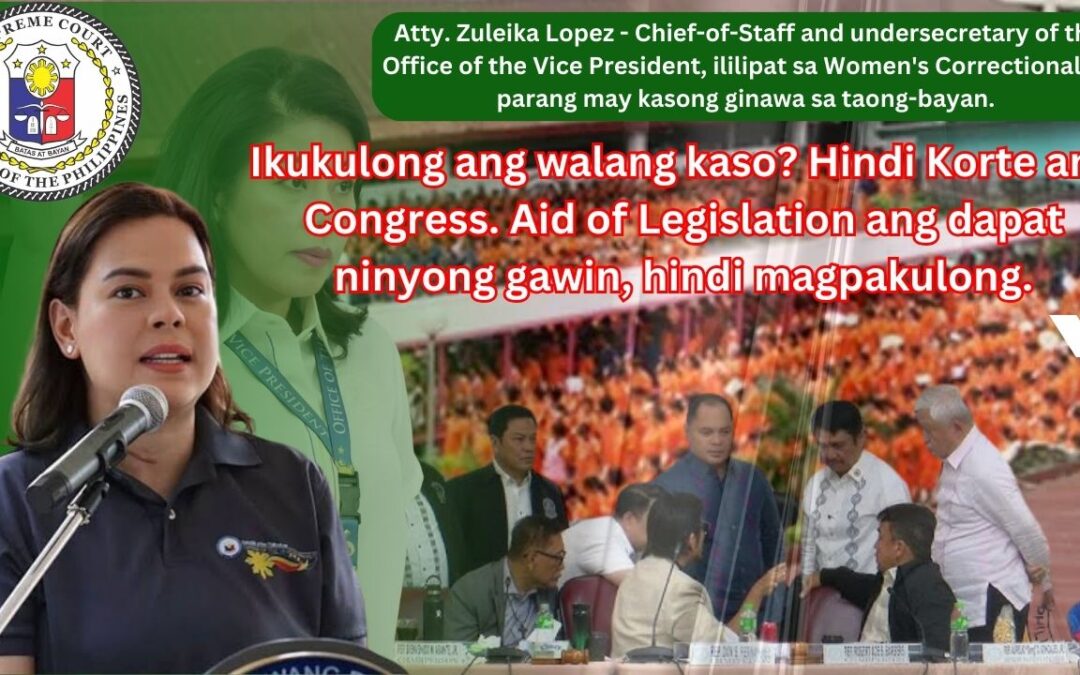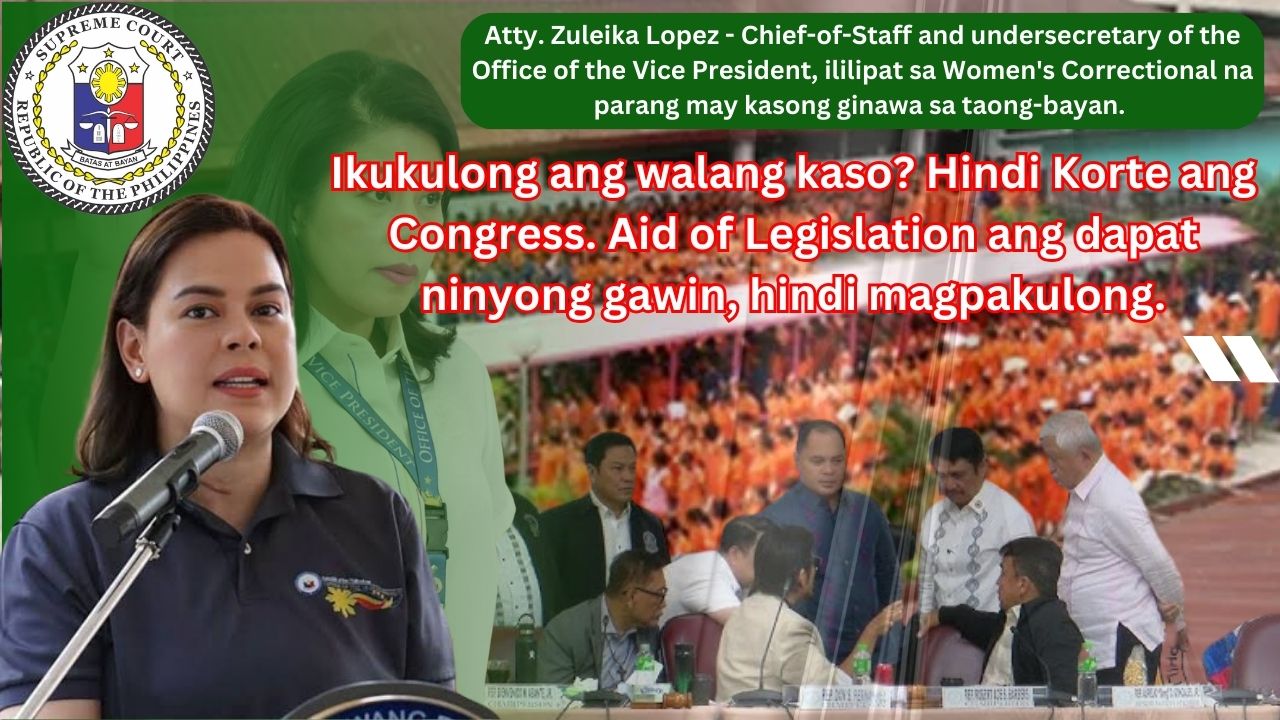The Unconstitutional Transfer of Atty. Zuleika Lopez: A Violation of Human Rights and the Rule of Law
The recent transfer of Atty. Zuleika Lopez, Chief of Staff and Undersecretary of the Office of the Vice President, from Congress detention to the Women’s Correctional in Mandaluyong has sparked widespread concern. Legal experts and human rights advocates argue that this act blatantly violates constitutional principles and disregards the fundamental separation of powers in the Philippine government. Below, we delve into the details of this unconstitutional act, its implications, and the defined roles of the Legislative Department.
1. Congress’ Authority: The Scope of Legislative Functions
The Philippine Constitution defines the Legislative Department’s primary role as the creation and amendment of laws. Congress is empowered to conduct hearings “in aid of legislation” to gather insights and testimony necessary for crafting effective laws.
However, Congress’ power to compel resource persons to appear and answer questions during these hearings does not extend to judicial functions. The authority to cite individuals in contempt is purely administrative and is meant to ensure order and cooperation during proceedings—not to act as a punitive measure akin to conviction.
Legislative Hearing in Aid of Legislation
The primary purpose of a legislative hearing is to:
- Investigate pressing societal issues that require legal intervention.
- Identify gaps or weaknesses in existing laws.
- Gather expert opinions and testimonies to inform future legislation.
Congress’ hearings are not judicial in nature, and the proceedings cannot result in criminal convictions or penalties. Any act beyond this scope, such as transferring a resource person to a correctional facility, constitutes overreach and undermines constitutional governance.
2. Citing in Contempt: Defined Limitations
Citing a person in contempt is a tool available to Congress to address individuals who disrespect the committee or refuse to cooperate in a hearing. While contempt may result in temporary detention, this power is administrative and does not carry the authority to impose judicial penalties, such as incarceration in correctional facilities.
In the case of Atty. Zuleika Lopez, the Quad-Committee’s decision to transfer her to the Women’s Correctional crosses a clear constitutional boundary. Contempt citations are designed to protect the legislative process—not to serve as a proxy for judicial sentencing. Congress has no power to impose punishment that equates to a criminal conviction.
3. The Separation of Powers: Protecting Constitutional Integrity
The Philippine government is built on the principle of the separation of powers among the Legislative, Executive, and Judicial branches. Each branch has distinct functions to ensure that no single entity wields excessive power:
- Legislative: Makes laws and oversees legislative hearings.
- Judiciary: Interprets laws, resolves disputes, and determines guilt or innocence in criminal and civil cases.
- Executive: Implements and enforces laws.
The act of transferring Atty. Zuleika Lopez to a correctional facility assumes a judicial role, violating the doctrine of separation of powers. Such overreach undermines the balance of power and sets a dangerous precedent for legislative abuse.
4. Due Process and Human Rights Violations
The transfer of Atty. Lopez disregards her constitutional rights, particularly the right to due process and the presumption of innocence.
- Due Process: The Constitution guarantees that no person shall be deprived of life, liberty, or property without due process of law. Atty. Lopez has not faced trial or been convicted of any crime, making her detention in the Women’s Correctional unlawful.
- Presumption of Innocence: Until proven guilty in a court of law, every individual is presumed innocent. Detaining Atty. Lopez in a correctional facility meant for convicted criminals violates this fundamental principle.
Arbitrary detention, such as this, contravenes both domestic laws and international human rights standards, which protect individuals from punishment without legal justification.
5. Implications of Legislative Overreach
The decision to transfer Atty. Zuleika Lopez has far-reaching implications for governance and civil liberties:
- Erosion of Trust in Institutions: The misuse of contempt powers undermines public trust in Congress and its legislative processes.
- Precedent for Abuse: If unchecked, this action could embolden similar abuses of power in the future.
- Threat to Human Rights: Arbitrary detention endangers the rights of all citizens, particularly those who challenge powerful institutions.
This incident serves as a stark reminder of the importance of adhering to constitutional boundaries to protect democracy and the rights of individuals.
Conclusion: Upholding Constitutional Principles
The transfer of Atty. Zuleika Lopez from Congress detention to the Women’s Correctional is an unconstitutional act that disregards her rights and the rule of law. Congress’ authority is limited to legislative functions, and its power to cite individuals in contempt cannot substitute for judicial processes.
For justice to prevail, it is crucial to rectify this violation and ensure that constitutional principles are respected. Upholding the separation of powers and the presumption of innocence protects not only Atty. Zuleika Lopez but also the democratic foundations of the Philippines.


